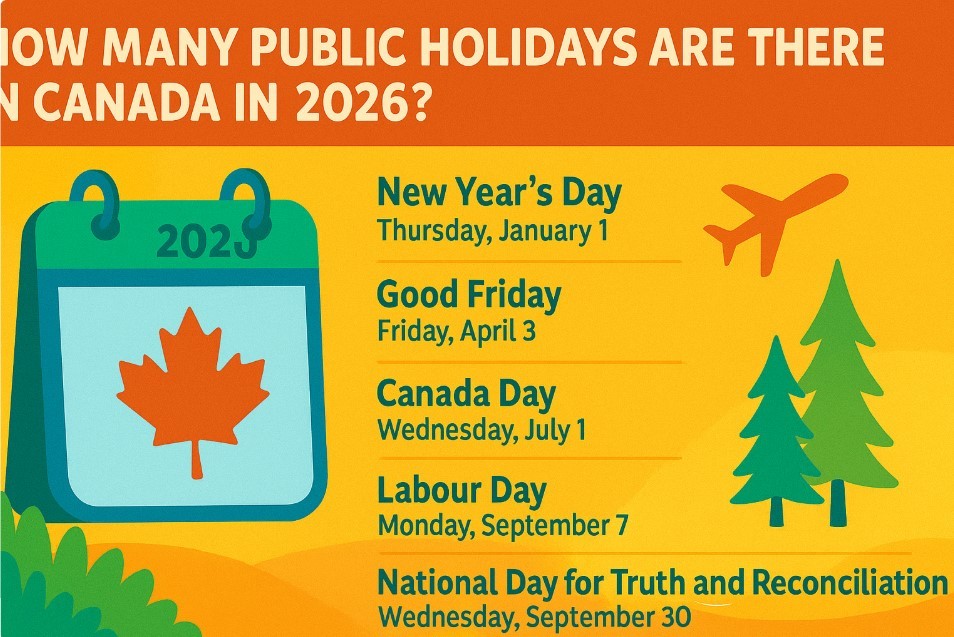Mexico Calendar 2026: Full List of Holidays, Festivals, And Celebrations
Mexico is celebrated worldwide for its rich and vibrant cultural heritage, deeply reflected in its public holidays and traditional celebrations. In 2026, these occasions continue to highlight the country’s distinctive blend of ancient Indigenous customs and Spanish colonial influences, resulting in colorful, meaningful events that honor history, faith, and national identity. From intimate family gatherings to lively street festivals, Mexican holidays are defined by a powerful sense of community, devotion, and joyful celebration.
Public holidays in Mexico generally fall into two categories: official national holidays and cultural observances. National public holidays are legally recognized days off observed across the country, while cultural observances—though not always work-free—hold significant social, historical, and spiritual importance for Mexican communities.
Mexican Public Holidays and Observances: Cultural and Social ImpactPublic holidays in Mexico play a vital role in shaping the nation’s cultural identity, offering moments to reaffirm core values such as family unity, spirituality, and pride in history. Beyond their cultural importance, these celebrations also have a meaningful impact on Mexico’s social and economic life. Major occasions like Independence Day, Day of the Dead, and Holy Week attract both domestic and international visitors, driving tourism and supporting local economies. Through these shared celebrations, Mexicans honor their heritage and create lasting traditions that strengthen community bonds across generations. |
National Public Holidays, Observances and Regional Celebrations in Mexico in 2026
Here’s a look at Mexico’s national public holidays in 2025, each accompanied by details on their historical background, customs, and cultural importance.
January 1: New Year’s Day
New Year’s Day in Mexico is celebrated with family and friends as they gather to welcome the upcoming year with joy, optimism, and unity. Many people spend New Year’s Eve engaging in various traditions, such as eating twelve grapes at midnight for good fortune and wearing colored underwear that symbolizes wishes for the coming year (red for love, yellow for wealth, and green for health). Mexican families often enjoy festive meals with tamales, pozole, and buñuelos while sharing stories, toasts, and resolutions for the future.
February 5: Constitution Day
Constitution Day commemorates the signing of the 1917 Mexican Constitution, which laid the foundation for modern Mexico by establishing labor rights, land reform, and social justice principles. Observed on the first Monday of February, this holiday is a time for Mexicans to reflect on the importance of constitutional rights and political freedom.
Across the country, schools and communities hold events to honor the legacy of the Constitution, while government offices and many businesses close for the day.
February 24: Flag Day
Flag Day is a patriotic observance in which Mexicans honor the national flag and reflect on the unity it represents. Schools and communities organize flag-raising ceremonies, during which the flag's colors and symbolism are explained. This day reinforces Mexican pride and national identity.
March 18: Oil Expropriation Day
Oil Expropriation Day marks the anniversary of the nationalization of Mexico’s oil industry in 1938 by President Lázaro Cárdenas. This significant act protected Mexico’s natural resources from foreign control, fostering a sense of economic sovereignty. On this day, Mexicans celebrate the country’s independence and strength, often with school and community discussions about the importance of petroleum to Mexico’s economy and independence.
March 21: Benito Juárez's Birthday
Benito Juárez's Birthday is a public holiday celebrating the life of one of Mexico's most revered leaders, Benito Juárez, who served as Mexico's first Indigenous president. Known for his commitment to democracy and his role in the Reform War, Juárez championed liberal reforms that shaped Mexico’s identity. March 21, his birthdate, is a day of patriotism and respect, often marked by speeches, educational activities in schools, and floral tributes at monuments dedicated to Juárez.
April 1-4: Easter (Semana Santa) Observances
Semana Santa, or Holy Week, is one of the most important religious observances in Mexico, and it includes Palm Sunday through Easter Sunday. Cities like Taxco and San Miguel de Allende are famous for their Semana Santa processions, featuring religious reenactments, parades, and elaborate displays of devotion. Many Mexicans travel to beaches or hometowns during this time, making Holy Week one of the busiest travel periods. The week is not an official holiday in all workplaces, but schools and many businesses close for the entire period.
May 1: Labor Day
Labor Day in Mexico, also known as Día del Trabajo, is a public holiday that celebrates the achievements of the labor movement. On this day, Mexicans honor workers' rights and fair labor practices with parades, rallies, and speeches. Major cities often host large gatherings where union leaders and workers advocate for improvements in labor conditions, reflecting the holiday’s continued relevance.
May 5: Cinco de Mayo
Cinco de Mayo celebrates the Mexican army’s victory over French forces at the Battle of Puebla in 1862. Although not a national holiday, it is widely celebrated in Puebla with parades, historical reenactments, and cultural events. Cinco de Mayo is also recognized internationally, especially in the United States.
September 15: Cry of Dolores (El Grito de Dolores)
El Grito de Dolores marks the start of Mexican Independence celebrations on the evening of September 15. The President of Mexico and governors in major cities reenact “El Grito,” or “the cry for independence,” followed by fireworks, music, and celebrations. This observance enhances the patriotic spirit leading up to Independence Day.
September 16: Independence Day
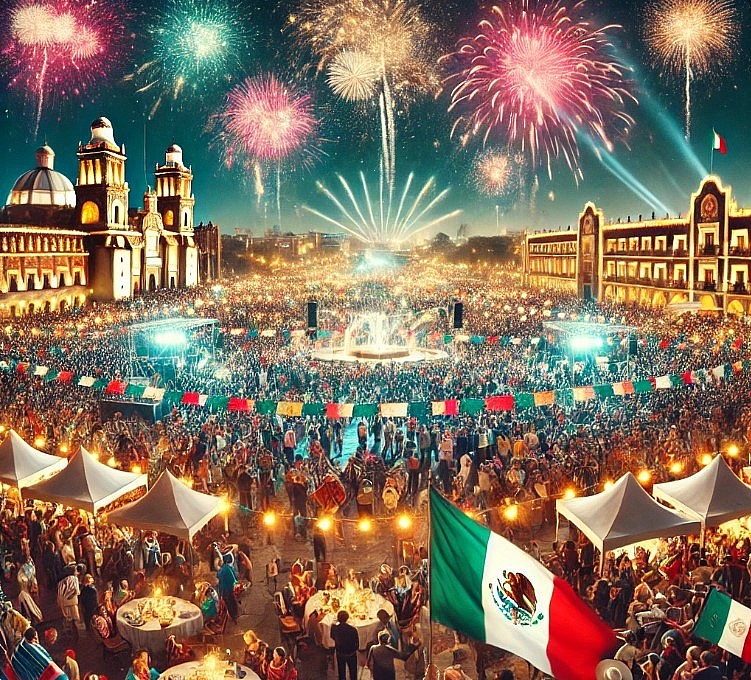 |
| The illustration for the El Grito de Dolores Celebration on Mexican Independence Day |
Independence Day, or Día de la Independencia, commemorates the beginning of Mexico’s struggle for independence from Spain in 1810. Celebrations begin on the evening of September 15 with “El Grito de Dolores,” a reenactment of the cry for independence by Miguel Hidalgo. Fireworks, parades, traditional foods like chiles en nogada, and folk dances characterize this patriotic holiday, which is celebrated in every town and city across Mexico.
November 2: Day of the Dead
Día de los Muertos, or Day of the Dead, is a vibrant cultural observance where Mexicans honor their deceased loved ones. Families set up altars adorned with marigolds, candles, sugar skulls, and the favorite foods of the deceased to welcome their spirits back for a brief reunion. Celebrated with a mixture of solemnity and joy, Day of the Dead is recognized worldwide for its colorful traditions and is a UNESCO-recognized cultural heritage event.
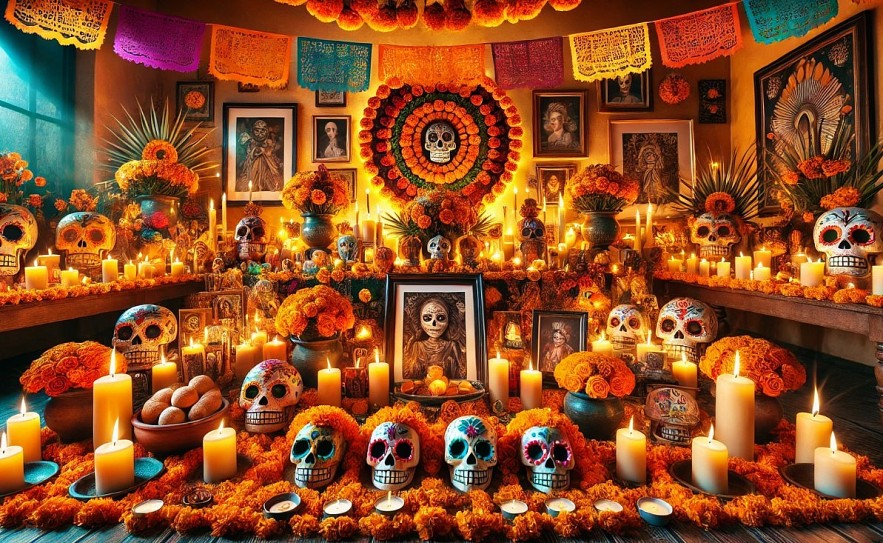 |
| Day of the Dead |
December 12: Feast of Our Lady of Guadalupe
The Feast of Our Lady of Guadalupe celebrates the appearance of the Virgin Mary to Juan Diego in 1531. This day is marked by pilgrimages to the Basilica of Our Lady of Guadalupe in Mexico City, as well as local celebrations and prayers. The Virgin of Guadalupe is a deeply revered figure in Mexican Catholicism, symbolizing faith, protection, and Mexican identity.
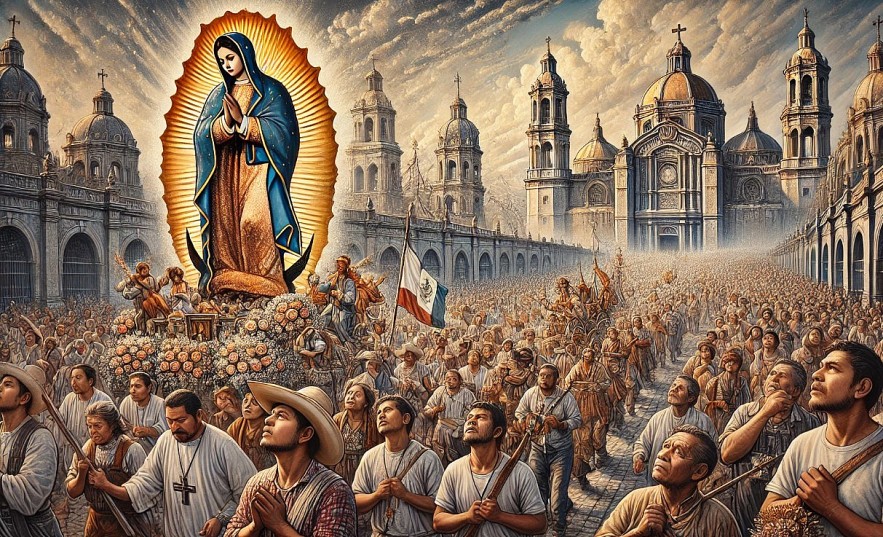 |
| the illustration of the Feast of Our Lady of Guadalupe Pilgrimage |
December 16-24: Las Posadas
Las Posadas is a nine-day celebration that reenacts the journey of Mary and Joseph seeking shelter. Celebrated with processions, prayer, and community gatherings, Las Posadas reflects the importance of family, hospitality, and faith in Mexican culture. Children often play a central role in these reenactments, adding a joyous element to the event.
December 25: Christmas Day
Christmas Day in Mexico is celebrated with religious observances, family gatherings, and traditional Mexican foods like tamales and bacalao. While similar to global Christmas celebrations, Mexican traditions often include Las Posadas, a reenactment of Mary and Joseph’s search for shelter, celebrated from December 16-24. Christmas Day itself is usually a quieter time for families to reflect and rejoice together.
Conclusion
Public holidays and observances in Mexico play an essential role in preserving Mexican culture and fostering national pride. These days are filled with color, reverence, and joy, whether through family gatherings, patriotic displays, or cultural traditions.
In 2025, as these holidays unfold, they will continue to bring communities together and showcase the rich diversity of Mexican heritage. For both locals and visitors, these celebrations offer a glimpse into the heart of Mexico, where history and tradition are cherished and celebrated with passion and pride.
Frequently Asked Questions (FAQ)
Are all public holidays in Mexico paid days off?
No, only certain holidays are legally recognized as paid days off for employees, such as New Year’s Day, Constitution Day, and Independence Day. Some employers may offer additional holidays as paid leave, but it varies by workplace.
What are the busiest travel times in Mexico due to public holidays?
Semana Santa (Holy Week) and Day of the Dead are some of the busiest travel periods, as many Mexicans travel to be with family or participate in regional festivities.
Is Cinco de Mayo widely celebrated across Mexico?
Cinco de Mayo is primarily celebrated in Puebla, where the Battle of Puebla took place. While it is popular in the United States, it’s a relatively minor observance in other parts of Mexico.
Do Mexican schools and businesses close for all public holidays?
Most schools and businesses close for major national holidays, but it depends on the holiday. For example, while schools close for Semana Santa, not all businesses do. Regional observances may or may not lead to closures.
Are there unique local holidays or observances in different regions of Mexico?
Yes, several regions have unique celebrations. For instance, Oaxaca hosts the Guelaguetza, a festival celebrating Indigenous culture, and Guadalajara holds celebrations for Día de la Virgen de Zapopan.
 7 Weirdest Things to Know Before Visiting New Mexico 7 Weirdest Things to Know Before Visiting New Mexico New Mexico is a pretty unique and awesome place and famous for amazingly delicious foods. However, there is something you should know about this state. |
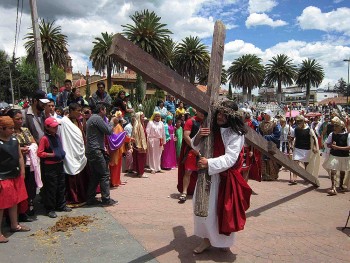 Full List Of Public Holidays In Mexico In 2024 Full List Of Public Holidays In Mexico In 2024 Check out how many public holidays in Mexico in 2024 and how local people celebrate them. |
 Top 10 Most Beautiful Mexican Women in 2024/2025 Top 10 Most Beautiful Mexican Women in 2024/2025 Who stands out as the most visually stunning and enchanting Mexican woman of 2024/2025? Keep yourself informed about the latest rankings in Mexican beauty. |

